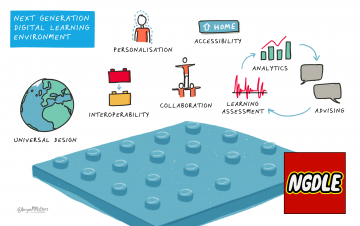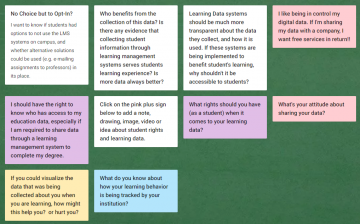Contribute!
The Learning Management System in Real Life
Unknown Strangers in the Classroom

Imagine yourself walking into a classroom. At the front of the room, your instructor is seated with six other people. These people have clipboards, stopwatches, and take extensive notes. Unlike your instructor, the identities of these six people are unknown; they’re all wearing masks.
As you enter, the group of unknown strangers asks for your identification. They write down your name, your major, your year of study, and what you’re wearing. They don’t introduce themselves, but maintain a steady gaze in your direction.
You become concerned about this invasion on your privacy and ask the instructor about these people.
“I don’t know who they are,” the instructor responds. “But I’m told that they’re here to help you.”
“Who told you that?” you ask, while the pens of the unknown strangers furiously record your conversation.
“They did,” the instructor says, motioning towards the unknown strangers.
Why is it that, in real life spaces, this kind of tracking seems completely inappropriate and creepy, whereas in digital spaces pervasive tracking is easily overlooked? The detailed tracking of student’s behaviour within Learning Management Systems already takes place, yet the scenario described in embodied terms sounds like science fiction.
Why should you care?
Facebook and Google are among the richest and most powerful companies in the world because of the data they collect on users. It has been said that data is the new oil. The value of our data is in what can be learned or inferred about us through our interactions. Businesses use this to gain a competitive advantage. Universities and schools may use our data to make inferences about learning. But what are the implications for our privacy when we use systems and applications that collect and use our data? Why should we care and do we have rights to manage our own data?

So what will a NGDLE look like? by @bryanMMathers: CC-BY-ND
Learning management systems such as Canvas and Connect (Blackboard) within Canadian universities collect data about students’ learning. With the new generation of digital learning environments (called NGDLE) the picture becomes even more complex – with the possibility of a variety of learning applications being pieced together to form new learning environments (think ecosystem) and each one of those components having the capacity to extract, track, share and analyze your data.
Universities want to harness student data on learning to derive insights from the patterns they observe.The problem is, most student have no idea that their movements in student learning environments are being recorded.
Recently, the UBC Faculty Association issued a statement raising concerns about privacy while using Connect and Canvas.
Throughout this past year I have become increasingly aware of the privacy issues involved in learning management systems (LMS). Students apparently sign over their privacy rights as a function of using the LMS. The consequence of this is that they can be tracked for every single thing they do within a course (how long they spent on the course website during the term, what assignments they did or did not complete, how they responded to various questions, discussions, etc.) – Professor Nancy Langton, President, UBCFA
Last year, we also documented the privacy concerns facing students in our blog series and video, Connect: Exposed.
Make your voice heard
If you’re interested in having some control over the information that unknown strangers are recording, storing, and analyzing about you, participate in the creation of our draft bill of rights about student data.
The theory goes that the more data we collect, the closer we will be to understanding how every student learns and we’ll be able to personalize the optimize the learning experience. This is not unlike the promise of improved, personalized service offered by Google or Facebook in exchange (of course) for you sharing information about you with them. You are trading your data for a convenient, personalized experience.
But what is at risk when we open ourselves up to being tracked and analyzed in this way? Is the trade off worth the privacy risk?
And if we agree to the taking of our data, should we not also be able to see and benefit from the view of our own data traces? Should we not have the right to decide how we want our data to be used in our learning environments and who should have access to it? How can we be better informed and better prepared for these important conversations?
Currently, UBC is moving towards creating a policy around the collection and use of student data on the new LMS (Canvas), but they aren’t yet soliciting feedback. You’ll have opportunities to have your say and we hope that you’ll start thinking about your rights and responsibilities in this new space. Our contribution is to draft a proposed Bill of Rights around Student Learning Data. We hope you will help us.
Contribute!
Share your thoughts on our Padlet!


